 |
 |
 |
 |
 |
 |
 |
 |
 |
 |
|
KICP Workshops & Events
|
KICP Workshops, 2013 Imaging the Extreme Universe: Solid-state cameras for Astroparticle Physics May 9 - 10, 2013 | Chicago, IL Website The Kavli Institute for Cosmological Physics (KICP) at the University of Chicago will host a two-day workshop focusing on solid-state technologies to build cameras for both space and ground-based astroparticle physics experiments. In particular, alternatives to MAPMTs for the JEM-EUSO focal plane and CTA cameras will be discussed including SiPM and G-APD. The workshop will be structured as a series of presentations with ample time for discussions and working sessions. Read more >> Related Links: KICP Members: Pedro Facal; Andrew McCann; Angela V. Olinto; Paolo Privitera; Scott P. Wakely KICP Students: Christopher Williams Supernova Hub hosts the JLA (SDSS+SNLS) collaboration meeting May 15 - 17, 2013 | 9:45 AM | Chicago, IL 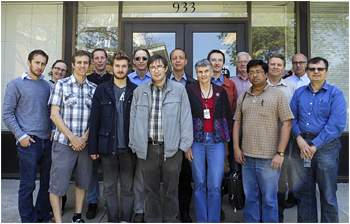 The Supernava Hub at the KICP will host a joint meeting of the SDSS+SNLS (JLA) collaboration which takes place May 15-17 2013 at the University of Chicago. The meetings will start Wed morning at the Temporary Astronomy & Astrophysics Center(TAAC). The Wednesday talks are each 30 minutes to include plenty of time for discussion. The Thursday & Friday discussions can include short presentations as needed. Note that there will be no food at the meeting locations. Wednsday May 15 (TAAC 67, all day) 1. 09:45 am: introduction/welcome 2. 10:00 am: overview of cosmology analysis (Marc) 3. 10:30 am: General PS1 updates (Sclonic) 4. 11:00 am: Break 5. 11:30 am: calibration summary (Marc) 6. noon - 2pm: lunch 7. 2:00 pm: training systematics (Jennifer) 8. 2:30 pm: intrinsic scatter (Rick) 9. 3:00 pm: sources of intrinsic scatter (Scolnic/PS1) 10. 3:30 pm: break 11. 4:00 pm: add SDSS into the training (Rahul) 12. 4:30 pm: SDSS data release update (Masao) Thursday May 16 (TAAC 67 from 9am to 1pm, LASR East from 2-5pm) 1. Finish talk(s) from Monday 2. discussion of papers in prep (includes short presentations) 3. u band anomaly 4. simulated mu bias 5. host properties 6. selection requirements 7pm: dinner in South Loop 9:30pm: Buddy Guy's Legends Friday May 17 (TAAC 67 from 9-1pm, BSLC rm 240 from 1-5pm) 1. future strategies for final cosmology results 2. results with photometric sample 3. extension of the SALT training sample + SN database : Patrick 4. project of SALT training vs host galaxy properties : Nicolas Related Links: KICP Members: Richard Kessler CTA Summer Collaboration Meeting May 28 - June 1, 2013 | Chicago, IL Website Organizer: Scott P. Wakely The next general meeting of the CTA Consortium will take place in Chicago, from May 28-June 1, 2013. Note that the general meeting will end on May 31 at 18:00 and on June 1 there will only be a CB meeting in the morning. The meeting sessions will be held at the Crowne Plaza Chicago Metro Downtown. A consortium dinner will be held on Thursday, May 30, with details to be announced later. This meeting is hosted by the Kavli Institute for Cosmological Physics (KICP) at the University of Chicago, along with the Enrico Fermi Institute, the Department of Physics and Argonne National Laboratory. Read more >> Related Links: KICP Members: Scott P. Wakely Dark Matter Hub Meeting June 6, 2013 | 9:30 AM | LASR conference room 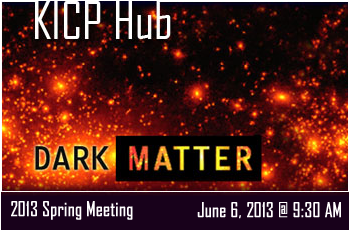 The 6 discussion leaders and topics will be: (each topic has been budgeted for 1/2 hour, so plan on a 20-minute presentation and 10 minutes of questions) 1. Andrey Kravtsov, Current status of CDM woes 2. Luca Grandi, A Look at the DarkSide 3. Ben Loer, CDMS recent Silicon results 4. Jing-Yuan Chen, Dark Matter Coupling to Electroweak Gauge and Higgs Bosons 5. Ilia Cholis, The AMS positron fractions: interpretations 6. Tongyan Lin, Looking for dark matter at LHC from top and bottom production Plus some thoughts/discussions on UV completions of the effective field theory. Related Links: KICP Members: Luca Grandi; Edward W. Kolb; Andrey V. Kravtsov; Tongyan Lin First Annual GMT Community Science Meeting: "Cosmology in the Era of Extremely Large Telescopes" June 10 - 12, 2013 | University of Chicago's Gleacher Center, Chicago, IL Website Organizers: Richard G. Kron, Joshua A. Frieman The Kavli Institute for Cosmological Physics (KICP) at the University of Chicago and GMTO are planning a joint workshop to be held in Chicago on June 10-12, 2013. The goal of the conference is to examine the role of galaxies as probes of cosmology, both today and in the future as large galaxy surveys and the next generation of large telescopes, in space and on the ground, come into being. We will bring together theorists and observers to discuss contemporary problems in cosmology and galaxy evolution as well as the opportunities offered by a new generation of facilities and surveys. The conference will be organized into five half-day sessions. Keynote speakers will provide an overview of the state of theory and observation in each subfield. Contributed lectures will delve into the details of front-line research issues. The first session will review relevant surveys and facilities, including the GMT, large imaging surveys such as the Dark Energy Survey, LSST, and Euclid among others, and upcoming missions, such as the James Webb Space Telescope. This will be followed by sessions on First-Light and Reionization of the Universe, Galaxy Formation and Assembly, Intergalactic and Circumgalactic Gas, and Galaxies & the Intergalactic medium as probes of Dark Matter and Dark Energy. The conference will be held in downtown Chicago at the University of Chicago's Gleacher Center. A gala conference banquet will be held at the Adler Planetarium looking out on to Lake Michigan. Read more >> Related Links: KICP Members: Hsiao-Wen Chen; Joshua A. Frieman; Michael D. Gladders; Richard G. Kron; Michael S. Turner Scientific projects: Giant Magellan Telescope (GMT) Galaxies within the Cosmic Web June 17 - 21, 2013 | KPTC, the lecture hall 120 Website | Photo Gallery Organizers: Nickolay Y. Gnedin, Andrey V. Kravtsov The Kavli Institute for Cosmological Physics (KICP) at the University of Chicago will host "Galaxies within the Cosmic Web" workshop on June 17-21, 2013. The workshop will be held in the lecture hall 120 in the Kersten Physics Teaching Center (KPTC) on the University of Chicago campus. During the last thirty years, studies of structure formation have played a key role in establishing the Cold Dark Matter (CDM) paradigm of structure formation in an expanding universe. In the CDM model the initial Gaussian density perturbations are shaped by gravity into a cosmic web of voids and filaments, at the intersection of which galaxies and galaxy clusters are mainly thought to form. Although the model has been a tremendous success in explaining the observed large-scale structure of the universe, many key aspects of how galaxies form and evolve within this cosmic web of dark matter and diffuse gas are still not understood. The gaps in our understanding not only hamper interpretation of the wealth of observational data on galaxy evolution, but also represent a major systematic uncertainty for cosmological probes of the accelerated expansion of the universe, the nature of gravity, and forecasts and interpretation of direct and indirect dark matter searches. This workshop will assemble both observers and theorists (target size ~60-80 people) who work on all key aspects of galaxy formation to assess recent progress and, most importantly, to germinate new ideas for how to improve our understanding of galaxy formation, the relation between the baryonic mass of galaxies and their parent halos, the effects of galaxy assembly and associated feedback on the spatial distribution of dark matter, and the interpretation of galaxy clustering and bias from large surveys to constrain the evolution of dark energy. The focus of the meeting will be on the most rapidly developing and interesting topics of research, and the format will include ample time for discussion and unstructured interaction. Read more >> Related Links: KICP Members: Nickolay Y. Gnedin; Andrey V. Kravtsov CARMA Science Symposium July 8 - 9, 2013 | Chicago, IL Website Organizers: Adam Mantz, Tom Plagge The Kavli Institute for Cosmological Physics (KICP) at the University of Chicago will host the 2013 CARMA Science Symposium on July 8-9, 2013. The two-day meeting will feature presentations relevant to the wide range of interdisciplinary science pursued with CARMA. In particular, there will be presentations from the community on potential future directions for CARMA-related research. These presentations include potential collaboration with new observatories, and science for which CARMA is uniquely suited. Contributions from outside CARMA member institutions are welcome. Graduate students and postdocs are encouraged to submit a presentation. Read more >> Related Links: KICP Members: Adam Mantz; Tom Plagge DESSN workshop July 15 - 19, 2013 | Chicago, IL 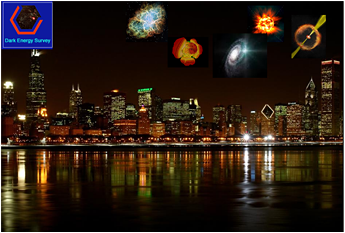 The KICP at the University of Chicago will host a week-long workshop dedicated to the Supernova program within the Dark Energy Survey (DES). Since the first DES season starts in September 2013, this workshop will be the final gathering of collaboration-wide expertise to prepare the SN-search software pipelines that run at both NCSA and at Fermilab. While the first three days of the workshop (Mon-Wed) are focussed on the search pipelines, the latter three days (Wed-Fri) will be dedicated to ramping up the analysis, with a focus on cross-cutting tasks that are needed in many analyses. Cross-cutting tasks include final photometry, simulations, measuring the search efficiency, SN-host matching and photometric classification of light curves. Related Links: KICP Members: Richard Kessler Colors Answers, Yerkes Summer Institute August 4 - 10, 2013 | Yerkes Observatory, Williams Bay, WI 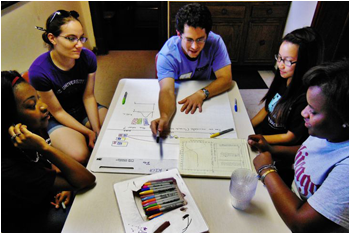 Instructors: Louis Abramson, Ross Cawthon, Dylan Hatt, Sean Johnson, Randy Landsberg, Samuel Meehan, Sean Mills, Kyle Story, Kat Ziegler The Yerkes Summer Institute (YSI) is a week long, residential, science camp for inner-city high school students in the Space Explorers Program. In addition to providing the students a science immersion experience, it offers many teaching, curriculum design, communications and team working opportunities for the instructors, who are generally early career scientists. YSI 2013 focused on the information content of color as an investigative tool. In each lab, students applied a different type of spectrometer to measure the wavelength or, roughly-speaking, color components of light in order to identify the composition of unknown objects or substances. During the first part of the week, students cycled through three different day-long laboratories, which focused on color vision, food color dyes, and stellar spectra. These daytime activities led to two days of extension activities in which groups of students investigated in greater depth one of the labs and prepared a presentation on their findings for their parents and peers. Nighttime activities focused on observations with the Yerkes Observatory telescopes and creation of colorful art. In "Seeing Color", students learned how color vision is the measurement of a wavelength spectrum by the eye. Students tested the usefulness of the eye as a spectroscopic tool by creating red-green-blue (RGB) histograms of low-resolution images to uniquely identify objects and pictures. In the conclusion of the laboratory, students recreate the process of color vision by applying RGB filters to produce a number of black and white photographs, which were then recombined with false color to form color images. The "Liquid Colors" lab discovered the properties of absorbance and transmittance for common FD&C dyes (e.g., Blue No. 1) using visible light spectrometers, Spectronic-20's, and then applied that knowledge to identify the composition of common colored beverages (e.g., Gatorade). During the "Barcoding the Stars" lab, students built their own spectrographs to observe the unique spectral signature of elements here on Earth in gas discharge lamps. After gaining an understanding of basic atomic physics, students used standardized spectra to identify the composition of stars. Related Links: KICP Members: Randall H. Landsberg KICP Students: Louis Abramson; Dylan Hatt; Sean Johnson; Samuel Meehan; Kyle Story Summer School: Computational Cosmology August 5 - 16, 2013 | Chicago, Il Website | Photo Gallery Organizers: Nickolay Y. Gnedin, Salman Habib, Katrin Heitmann, Andrey V. Kravtsov The Kavli Institute for Cosmological Physics (KICP) at the University of Chicago will host a Summer School on Computational Cosmology from August 5 to August 16, 2013. The aim of the School is to expose a select group of 15 to 20 graduate students to the challenges of modern high-performance computing in cosmological research. During the school the emphasis will be on specific hands-on projects designed to teach modern cosmological simulation techniques. The course will also inform students regarding current challenges in the era of petascale supercomputing, and near future challenges, as computation transitions from the petascale to the exascale within the next decade. Orientation discussion sessions on ongoing projects and/or a brief lecture in the morning of each day will be followed by work on individual research projects under the guidance and supervision of school instructors and assistants. The projects will be designed to teach students to set up and run modern N-body and associated analyses (halo finding, visualization, MCMC calculations). Computational work will be carried out on the University of Chicago midway cluster and on development racks of the Blue Gene Q Mira supercomputer at Argonne National Laboratory (ANL). The School will be held in the Laboratory for Astrophysics and Space Research (LASR) at the Kavli Institute for Cosmological Physics. Students will spend the last 2-3 days of the school at Argonne National Laboratory, where they will be introduced to the Argonne Leadership Computing Facility and the Exascale Technology and Computing Institute and will have a chance to implement visualizations of the data based on their school project at the ALCF visualization lab. Read more >> Related Links: KICP Members: Nickolay Y. Gnedin; Salman Habib; Katrin Heitmann; Andrey V. Kravtsov Dark Matter at the LHC September 19 - 21, 2013 | Chicago, IL Website | Photo Gallery Organizers: Tongyan Lin, Edward W. Kolb, Lian-Tao Wang KICP is hosting a workshop "Dark Matter at the LHC" this fall on the University of Chicago campus. The workshop will include both theorists and experimentalists actively working on LHC signals of dark matter. The focus will be on model independent approaches. Some topics we plan to cover are monojet, monophoton, and related searches, and improvements in theoretical predictions and experimental techniques. The goal of the meeting is to discuss avenues for taking full advantage of the next LHC run for dark matter studies. This includes exploring new signals of DM models that may be challenging for direct detection or indirect detection experiments, as well as more sophisticated calculations and analyses to improve existing searches. Topics: * Monojet searches for dark matter * Mono-photon, mono-Z, mono-b, and other signatures * Effective field theory constraints * Theoretical improvements in calculations Read more >> Related Links: KICP Members: Edward W. Kolb; Tongyan Lin; Lian-Tao Wang Cosmology After Planck Workshop September 23 - 25, 2013 | University of Michigan, Ann Arbor Website Organizer: Marilena LoVerde Inflationary cosmology has become an integral part of the standard model of the early Universe. Inflationary models and other signatures of of the early-Universe physics have become stringently constrained by WMAP and Planck, as well as powerful new large-scale structure surveys. This workshop will discuss the theoretical, observational, and experimental aspects of inflation and primordial physics, interpreted broadly. We plan to gather 20-30 of the top experts in the field. Read more >> Related Links: KICP Members: Marilena LoVerde Kavli workshop for scientists: "Communicating Science" September 26 - 28, 2013 | Chicago, IL Website Organizers: Randall H. Landsberg, Michael S. Turner Join Alan Alda, The Kavli Foundation, and the Alan Alda Center for Communicating Science for an innovative workshop, September 26-28, 2013, hosted by the Kavli Institute for Cosmological Physics (KICP) at the University of Chicago. As host of the PBS program Scientific American Frontiers, Alan Alda interviewed 700 scientists around the world. Now, as a founding member of the Alda Center at Stony Brook University, he is helping scientists learn to communicate effectively with the public, including public officials, funders, employers, students, the media, and potential collaborators in other disciplines. The workshop, led by Alan Alda and representatives from the Alda Center at Stony Brook University, will focus on science communication to reporters, philanthropists, policymakers and the public. This is a 3-day program, with two days of required workshops followed by an optional third day for participants who want more intensive practice. Participants will focus first on improving their skills in understanding and connecting with an audience, and speaking clearly about complex material. Then they will work on applying these skills productively in challenging settings, using scenarios and materials tailored to their real-world needs. This will include practice interviews by reporters on video. The workshop will be run in two tracks - a master class for those with prior experience in public communication, policy or media and shorter introductory track. This workshop is sponsored by the Kavli Foundation and the Kavli Institute for Cosmological Physics, with additional support from the Dean of Physical Sciences, the Logan Center for the Arts and the UofC Arts/Science Initiative. Read more >> Related Links: KICP Members: Randall H. Landsberg; Michael S. Turner Dark Matter Hub Meeting November 22, 2013 | 8:45 AM | LASR conference room 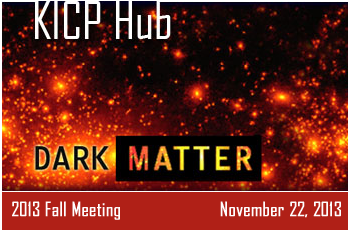 The agenda include 1) A discussion on gamma ray excess from the GC (Tim Linden) 2) Update of CoGeNT (Juan Collar) 3) CDMS ( Rito Thakur) 4) LUX (Richard Saldanha) Followed by Friday noon seminar by Annika Peter on "WIMP Physics with Direct Detection" The schedule can be found at Dark Matter Hub website. Logistics: For those unfamiliar with campus, LASR is located at 933 East 56th Street, just west of Ellis Ave. The entrance to the building is on the south side next to the lovely construction trailers. Parking is available in the pay lot at the corner of 55th St. and Ellis Ave., or free parking on the streets north of 55th St. Related Links: KICP Members: Juan I. Collar; Tim Linden; Richard Saldanha; Lian-Tao Wang Transforming Energy, Yerkes Winter Institute December 27 - 29, 2013 | Yerkes Observatory, Williams Bay, WI 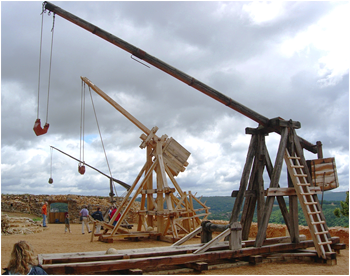 In this years Yerkes Winter Institute, students will learn about how energy can be transformed using the concept of mechanical advantage to make the most of the resources at their disposal. This idea will be introduced by studying how pulleys can be used to ease the lifting of heavy weights and how levers can be transformed into catapults to launch things great distances. They will then put their intuition of energy transformation to the test while competing to construct the most complicated Rude Goldberg machine, understanding each stage of energy transfer along the way. Related Links: KICP Members: Keith Bechtol; Juan I. Collar; Randall H. Landsberg; Tongyan Lin; M. Ted Ressell KICP Students: Samuel Meehan |


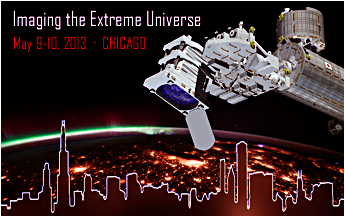
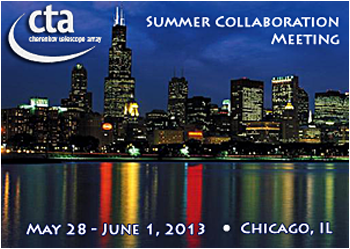
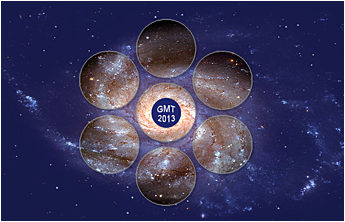

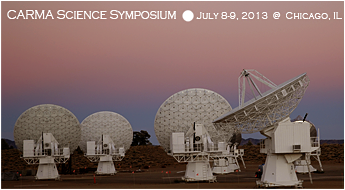
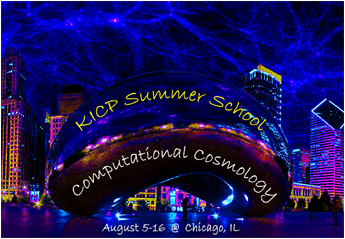

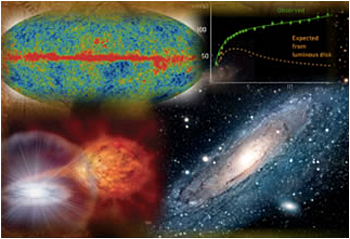




 Overview
Overview